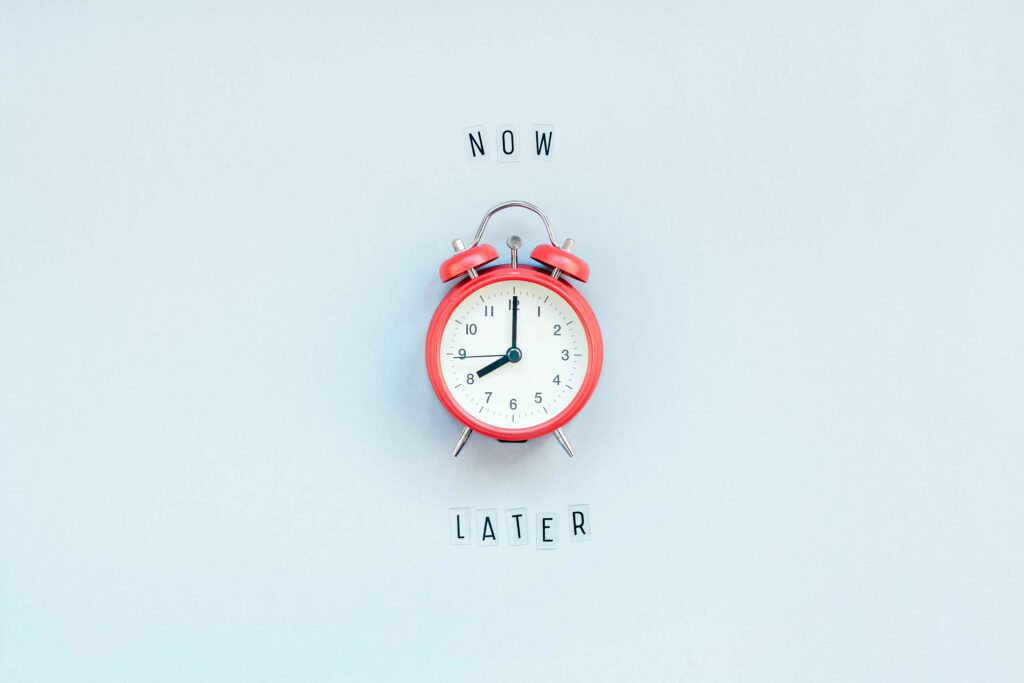Introduction
Have you ever found yourself saying, “I’ll do it tomorrow,” only to discover that tomorrow brings a whole new set of tomorrows? Procrastination is a crafty adversary we’ve all faced at various times. Picture this: a sunny Sunday morning, the perfect time for a leisurely cup of tea and the newspaper. Yet, in your mind, there’s that nagging task you promised to tackle this weekend. As the hours slip by, so does your resolve until the day ends with the task untouched and the promise deferred to another day.
This scenario is all too familiar for many of us. Yet, the stakes increase as we venture into our 50s and beyond. Procrastination isn’t just about delayed chores or postponed hobbies; it becomes a significant barrier to living our best lives during these golden years. For men over 50, the propensity to procrastinate can be particularly damaging, intertwining with life’s transitions—retirement, changes in family dynamics, and even personal identity shifts.
Why does the inclination to delay tasks grow stronger at a stage when many have more freedom than ever before? The reasons are complex and deeply rooted in our psychology and the unique challenges of ageing. This blog post aims to unravel these intricacies, offering insights into why we procrastinate and how men over 50 can break free from this cycle. By understanding the psychological underpinnings of procrastination, we embark on a path to better time management and enriched, more fulfilling lives.

Section 1: The Psychology of Procrastination
What is Procrastination?
At its simplest, procrastination is delaying or postponing tasks to a later time. However, this straightforward definition belies a complex web of psychological, neurological, and even evolutionary factors. Historically, procrastination could be seen as an adaptive response, allowing our ancestors to avoid unnecessary risks. In the modern world, though, the dangers we avoid are less about physical harm and more about emotional discomfort.
Psychologists often view procrastination not as a singular habit but as a manifestation of struggles with self-control and emotional regulation. “Procrastination is essentially an emotional regulation problem, not a time management problem,” states Dr. Tim Pychyl, a leading researcher in the field. This perspective shifts the focus from laziness or poor time management to deeper emotional mechanisms.
The Emotional Underpinnings of Procrastination
Our emotions heavily influence the decision to procrastinate. Fear of failure is a significant driver, especially poignant for individuals facing tasks where the stakes of failure are high, either in reality or in their perception. Anxiety and perfectionism are closely related, with the latter often leading to a paralysis of action. If one cannot do something perfectly, one opts not to do it.
Dr Jane Burka, co-author of “Procrastination: Why You Do It, What to Do About It Now,” highlights that “procrastination is not a character flaw but rather a coping mechanism for dealing with challenging emotions and negative moods induced by certain tasks — boredom, anxiety, insecurity, frustration, resentment, self-doubt.”
Life Transitions and Procrastination
For men over 50, life transitions such as retirement, health changes, or social role shifts can exacerbate the tendency to procrastinate. These transitions often bring about reevaluating one’s identity and worth, leading to uncertainty and avoidance behaviour.
Like many, I’ve found myself sliding into the role of a classic procrastinator over recent years. A telling example unfolded through a series of decisions—or indecisions—about my home.
It began with a simple question: Should we move to a new house or completely overhaul our home? This question hovered in the back of my mind, unresolved. Then, as life often does, it threw in a curveball. My youngest daughter was preparing to go to university, and the financial implications of this made me hesitate further. “Let’s hold off for now,” I thought, pushing the decision further down the road.

Just as the dust settled on that decision, our family welcomed a new member, a very lively GSD puppy named Lola! She’s a real handful and a lot of fun, but she also presented a new set of considerations. My wife and I discussed replacing our carpets with new flooring, a practical choice given Lola’s penchant for chewing everything in sight. Yet, I hesitated again, suggesting we wait until Lola outgrew her teething phase.
This pattern of putting things off, of waiting for the ‘right’ moment, highlights a complex dance with procrastination. It’s a narrative not just about home improvements but about how we navigate the uncertainties of life. The financial, emotional, and practical considerations that play into our decisions often intertwine, making it challenging to move forward
Section 2: The Impact of Procrastination on Men Over 50
Mental and Physical Health Consequences
The ripple effects of procrastination extend far beyond mere time management woes, particularly impacting the mental and physical health of men over 50. Chronic procrastination is linked to a myriad of health problems, including stress, anxiety, depression, and even cardiovascular diseases. Dr. Joseph Ferrari, a professor of psychology and a leading researcher on procrastination, notes, “Procrastination can affect health by increasing stress and delaying preventive action or treatment for health conditions.”
For men in this age group, the stress resulting from procrastination can exacerbate existing conditions such as hypertension or diabetes. The cycle of delaying health check-ups or ignoring symptoms due to fear or denial can lead to severe complications. Furthermore, the mental toll of constant stress, anxiety, and guilt can deepen into depression, a condition often underdiagnosed in men over 50 due to societal expectations around masculinity and self-reliance.
Social and Relationship Impacts
Beyond health, procrastination significantly affects personal and social relationships. Delaying or avoiding tasks can lead to misunderstandings, resentment, and strain in relationships with spouses, family members, and friends. For many men over 50, this period of life often involves renegotiating relationships with adult children, adjusting to retirement alongside a partner, or finding new social circles after work-life ends. Procrastination can isolate individuals, making it harder to navigate these transitions successfully.
Social psychologist Dr Linda Sapadin highlights, “Procrastination can erode the foundation of trust in relationships, as unfulfilled promises and unmet deadlines are perceived as a lack of respect or care.” Building and maintaining healthy relationships requires active engagement and communication, qualities that procrastination undermines.
Understanding its broad impacts is crucial to combating the negative spiral of procrastination. Recognising the detrimental effects on health and relationships can motivate men over 50 to seek strategies and support to overcome procrastination, paving the way for a healthier, more connected life.

Section 3: The Brain and Procrastination
Neuroscience Behind the Procrastination Habit
The tendency to procrastinate is more than just a bad habit; it’s deeply rooted in our brain’s wiring. Recent neuroscience research sheds light on why we procrastinate, revealing it’s not merely a lack of discipline but involves complex neural pathways.
The brain’s limbic system is at the heart of procrastination, responsible for our fight-or-flight response. This ancient part of the brain prioritises immediate reward and survival, often at the expense of long-term planning and benefit, which are managed by the brain’s prefrontal cortex. When faced with a daunting or unrewarding task, the limbic system can override our better judgement, pushing us towards more pleasurable or less stressful activities.
Ageing can complicate this dynamic further. Studies suggest that as we age, changes in brain function can affect the prefrontal cortex, impacting our decision-making and self-control abilities. Dr John Perry, a neuroscientist specialising in ageing, notes, “As we get older, the brain’s networks can become less efficient, potentially making procrastination more of a challenge to overcome.”
Strategies for Rewiring the Brain
Understanding the brain’s role in procrastination opens up new avenues for addressing it. Cognitive-behavioural techniques (CBT) and mindfulness practices are potent tools for rewiring the brain and combating procrastination.
CBT helps individuals recognise and change negative thought patterns and behaviours that lead to procrastination. By challenging these automatic thoughts and replacing them with more constructive ones, men over 50 can gradually shift their response to tasks they would typically avoid.
On the other hand, Mindfulness enhances awareness of the present moment, allowing individuals to observe their procrastination impulses without judgment. This increased Mindfulness can help break the cycle of avoidance and make it easier to take action. Dr Sian Beilock, a psychologist and author on performance, suggests, “Mindfulness can reduce stress and anxiety over tasks, making it easier to start them. Over time, this can help retrain your brain to respond differently to tasks you’re inclined to avoid.”
By incorporating these strategies into daily routines, individuals can begin to alter the neural pathways associated with procrastination, leading to more productive and fulfilling behaviours.

Section 4: Overcoming Procrastination – Tips and Strategies
Goal Setting and Time Management
Practical goal setting and time management are crucial in the battle against procrastination. By setting SMART goals—Specific, Measurable, Achievable, Relevant, and Time-bound—you create a clear roadmap for success. For example, instead of vaguely aiming to “start exercising,” a SMART goal would be “to walk 30 minutes, three times a week, starting Monday.”
Time management techniques like the Pomodoro Technique or time blocking can transform how you approach tasks. The Pomodoro Technique involves working for 25 minutes and taking a 5-minute break. This method helps maintain focus and limits burnout. Time blocking, on the other hand, involves dedicating specific blocks of time to different tasks or activities. It helps prioritise tasks and reduces the temptation to procrastinate.
Building a Support Network
A robust support network can significantly impact your ability to overcome procrastination. Accountability partners, whether friends, family, or colleagues, can keep you on track by regularly checking your progress. Supporting groups or clubs with like-minded individuals can also offer motivation and encouragement. For men over 50, finding peers who share similar goals or challenges can provide inspiration and practical advice for staying committed to overcoming procrastination.
Leveraging Technology for Productivity
Technology offers a plethora of tools to aid in combating procrastination. Here are a few apps and digital tools that come highly recommended:
- Trello: Ideal for organising projects and tasks into boards, lists, and cards. Trello lets you visualise your workflow and break down projects into manageable tasks.
- Forest: This app helps you stay focused by planting a virtual tree that grows while you work. Using your phone before the timer expires kills the tree, adding a motivational element to stay on task.
- RescueTime: Tracks how you spend time on your devices, providing insights into your productivity patterns. It can help identify significant time-wasters and adjust your habits accordingly.
By incorporating these strategies and tools into your daily life, you can develop a more disciplined approach to managing your time and tasks, ultimately overcoming procrastination.

Section 5: Harnessing the Power of Productivity
Success Stories: From Procrastination to Productivity
Hearing about others who have successfully navigated the journey from procrastination to productivity can be incredibly motivating. Consider the story of Alex, a 58-year-old former corporate executive who struggled with procrastination after taking early retirement. Overwhelmed by the sudden abundance of free time and needing more structure, Alex put off even tasks he enjoyed.
Alex gradually regained his sense of purpose by setting small, achievable goals and using the Pomodoro Technique. He volunteered for a local charity, rekindled his passion for painting, and even started a small online business. Alex’s story highlights the importance of structured goals and finding personal passion projects to drive productivity.
Another example is Martin, who, at 62, faced health issues that made him procrastinate on essential lifestyle changes. Through the support of a health coach and a dedicated support group, he slowly introduced exercise into his routine and improved his diet. Martin’s journey underscores the power of support networks and incremental changes in overcoming procrastination.
Finding Your Motivation and Inspiration
Discovering what truly motivates you is essential for overcoming procrastination. Here are some exercises and techniques to help you identify your motivators and inspirations:
- Vision Boarding: Create a visual representation of your goals, dreams, and what inspires you. Seeing these daily can help keep you motivated.
- Journaling: Spend a few minutes each day writing about what you’re grateful for, what you’re looking forward to, and what you’ve accomplished. This can boost your mood and motivation.
- Mind Mapping: For visually oriented people, mind mapping can help connect personal goals with actionable steps, making the journey to productivity more tangible and achievable.
Remember, motivation is personal and can change over time. It’s essential to regularly reflect on what drives you and adjust your strategies accordingly.

Conclusion
Throughout this exploration of procrastination, especially for men over 50, we’ve delved into the psychological underpinnings, the impact on mental and physical health, the neurological factors at play, and actionable strategies for overcoming this pervasive issue. From understanding the role of emotions and life transitions in fostering procrastination to recognising the effects on our health and social lives, it’s clear that procrastination is more than just a bad habit – it’s a complex behaviour that requires understanding and intention to overcome.
We’ve also seen that change is possible, with strategies ranging from setting SMART goals and managing our time more effectively to seeking out support networks and leveraging technology. The success stories shared highlight not only the challenges but also the profound sense of achievement and fulfilment that comes from breaking free of procrastination’s grip.
The first step in this journey is understanding why we procrastinate. Acknowledging the emotional, psychological, and neurological factors contributing to procrastination, we can begin to untangle its hold on us. It’s not an easy journey, but it is a worthwhile one. The message of hope is clear: change is possible at any age. With the right tools, strategies, and mindset, the later years can be some of our most productive and fulfilling lives.
As we conclude, let’s remember that understanding “Why Do We Procrastinate” is not just about avoiding delay; it’s about embracing a life where every moment is lived to its fullest potential. Let’s challenge ourselves to move beyond procrastination, reclaiming our time, and unlocking the doors to productivity and satisfaction that await us.
If you have found this blog post of interest, consider reading a post introducing my own journey to Mindfulness in my blog titled: A 50+ Man’s Guide to Mental Wellbeing – Trialling Headspace.
